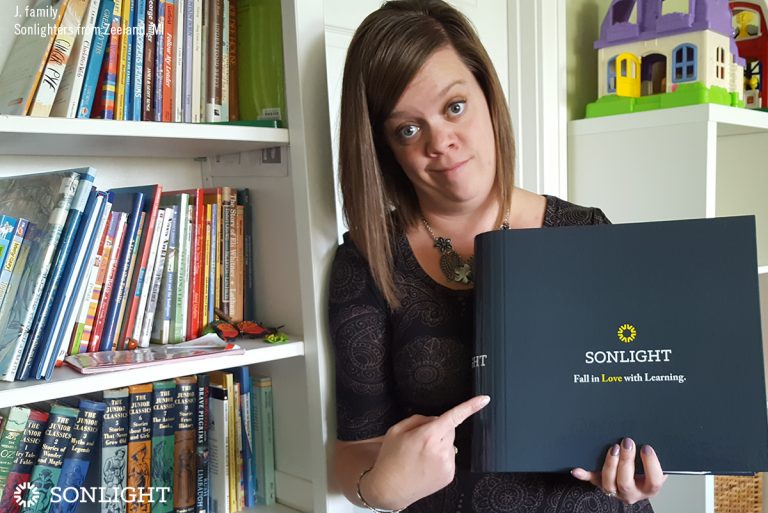Every once in a while we have one of those years where we fall behind schedule in homeschool. Just kidding! We fall behind schedule at least a few times every year.
Usually, I get a head start by beginning school in August; however, this year in an effort to enjoy summer a bit longer, I postponed our back to school date to mid-September after enjoying our family vacation. That choice turned out to be a huge mistake.
Hurricane Irma gave us an obvious aversion to the idea of flying to our destination the same morning Irma pounded through Orlando, FL. We love adventure, but that was too much adventure for us. So the vacation was delayed.
By the time we arrived home from our adventure and started school, Week 1 was glaring at me through the very last calendar pages of September. Much to this Type A mama’s dismay, I was already suppressing anxiety over our late start and feeling behind schedule.
"Breathe in. Breathe out," I told myself.
On top of a late start, our first few weeks of school were just plain rough!
- Little Brave would not be quiet during morning time.
- Wild Little Girl’s letters were starting out as giant, wild scribbles.
- Tenderhearted Boy wanted more work than I could give him.
- Dreaming Daughter was spending her history reading time doing exactly that—dreaming. Civil War? Was that in 1774? When they fought the British?
Oh, Lord, help me.

Within two weeks I feared if we continued at this pace we might get through half of our curriculum over the course of our 36-week school year. I was used to playing catch up after the holidays or mid-spring, but this rough and late start was not something I was used to!
I wallowed in a bit of defeat, and then I got a grip and started coming up with a plan. Here are the ways I managed to gain traction and catch up on my homeschool schedule.
1. Use Audiobooks
If, like me, you are balancing two History / Bible / Literature (HBL) schedules at the same time, you may find audiobooks a schedule saver. I alternate a Read-Aloud from each HBL to enjoy in audiobook format. It is much easier to catch up on other subjects when I’m not reading aloud for over an hour a day. As a bonus, sometimes we listen in the car as well.
2. Double a Subject Each Day
This tip is easy. Instead of doing one day's assignment, we cover two. I rotate through the subjects where we are lagging so this isn't a huge burden every day. So for example, on Day 1 we do two History assignments. On Day 2 we cover 2 Science assignments. On Day 3 we check off two Vocabulary lessons. This method helps us make slow but steady progress without overwhelming me or my children.
3. Throw a Big Subject Party
This solution works out especially well for Science. We set aside an afternoon when we knock out an entire week of lessons. I call it a Science party and shorten the lessons a bit. Adding a fun game or activity and a warm pan of brownies with hot chocolate usually helps to motivate my kiddos.
4. Plan to Skip School Breaks
This is always a time saver for my family because we live in a state with serious winters! When my kids' friends have a snow day off from school, we go ahead with school anyway, saving our day off for a sun day later in the spring when we are back on track with our 36-week schedule.
5. Skip Lessons
The wonderful thing about Sonlight is that it gives plenty of resources on any topic you are studying! For example, in HBL B, you may read about Vikings in 3 or 4 different books.
One way to catch up is to look at the schedule, decide you’ve read enough about Vikings and move on! It is okay not to do it all! In the Instructor's Guide, we are given the freedom to skip assignments, but we need to actually do it! I've learned to be okay with not checking every single box.
6. Read on Weekends
When reading aloud is something we struggle to keep up with, we add extra reading to bedtime on the weekends. If Dad can help out here, all the better!
7. Assign Homework for Evenings
As homeschoolers, we revel in the freedom not to have our kids doing homework at night, am I right? However, we don’t need to have such an aversion to the idea that we miss a good opportunity to catch up if we fall behind. I have found evenings are an ideal time to get extra school work done. My husband occupies the baby while I offer the older children one-on-one teaching.
If you find yourself falling behind schedule in homeschool like I so often do, I hope some of these ideas help you catch up! Don’t underestimate the power of momentum! Once you decide what way of recovering your year works best for your family, set your plan in motion and the progress will feel really good.
Scheduling Your Homeschool So You’re Not Behind
Now that you know how to catch up on school work when you are behind, let’s consider how you got there in the first place so you can minimize this situation going forward. Notice the word minimize. There is an ebb and flow to life that means you’ll always be swimming upstream to stay on track with your desired timeline. Sometimes you get a bit ahead; other times you get a bit behind. The goal is to stay on track most of the time so that you don’t feel you’re drowning.
If you always feel behind, there are two obvious corrections:
- Change your expectations.
- Or change your execution.
Change Your Expectations
Maybe you are homeschooling many children or you have a chronic illness. Maybe you’re a single parent with little outside support. Maybe you’re simply not a Type A person, and you need a more laid back lifestyle to feel whole.
Whatever the reason, you may want to rethink your expectations for working through your homeschool curriculum.
There is no magic to 36 weeks. It’s simply the norm of the public school system and the way most homeschool curriculum, including Sonlight, is structured. It's okay to spread out the 36 weeks over 18 months or 2 years!
Reframe your thinking: It's 36 sequential units and not necessarily 36 weeks of time.
One Sonlight mom provides excellent advice when it comes to changing your expectations.
“Avoid deadlines! We don't have to finish in June. We don't have to start in September. A week doesn't need to be done in 5 days. A week doesn't need to start on a Monday or end on a Friday. It's ok to do school on weekends and holidays. It's ok to take days off pretty much anytime you want.” —Jennifer Lauda
If you consistently feel behind, maybe your timeline is not doable for your family. Change the expectation instead of looking for ways to meet something that’s not attainable.
So Are Homeschoolers Behind?
Because homeschoolers have the freedom to redefine for themselves what’s on track, they may be labeled behind according to state standards or public opinion. Then the question becomes: Do state standards or public opinion really matter when it comes to homeschooling your child?
Some families have the confidence to totally discard outside standards and set their own course while other families keep at least one eye on what’s commonly accepted as being on grade level. You’ll need to find that sweet spot for yourself when it comes to who gets to define what’s behind in terms of working through a curriculum and the difficulty of the work.
Change Your Execution
If you think that the problem isn’t unrealistic expectations but more about structure and discipline, then change your execution.
One solution that provides flexible structure is to opt for routines instead of schedules. The video below will explain everything you need to know about routines compared to schedules.
Maybe you simply need a more clearly defined curriculum that does the heavy lifting for you. If you’re spending hours each week on a DIY homeschool, you may be exchanging learning time for planning time. Get that time back by choosing a more open-and-go program like Sonlight.
How Do You Motivate a Child Who Doesn’t Care?
The seven tips above help you get caught up in school when you feel like you’re falling behind on your 36-weeks of lessons that you expect to accomplish in the span of 9-12 months. But what if the issue isn’t time management, scheduling, or routines?
Sometimes you fall behind in school due to a lack of motivation. So how do you stay focused when homeschooling?
Transitioning from Public School to Homeschool
It’s not uncommon for kids who used to be in public school to resist homeschooling and lack motivation for their lessons. To be honest, they probably had little zest for learning in the classroom, too! But now you are fully aware of their resistance and are the person responsible for working through it with them.
This lack of motivation doesn’t mean that homeschooling is a bad idea. It just means that you need to rewire the connections in your child’s brain which are telling them school = boring.


Try a period of deschooling before you jump back into schoolwork. Just letting them play video games all day or watch TikTok videos is not an effective way to erase that negative brain training. During this time, establish a pleasant daily routine that allows for plenty of sleep, healthy meals, and a bit of daily exercise. Incorporate meaningful activities that don’t involve paper and pencil or books:
- field trips
- chores or home improvement projects
- hands-on creations or handicrafts
- nature exploration
- watching and discussing documentaries
- playing board or card games as a family
- organizing an upcoming vacation or a family holiday gathering
- meal planning and grocery shopping
Don’t try to sneak in learning. Just let learning happen naturally throughout your day. Talk to your child. Ask questions, listen, and observe. What are they interested in? What gets them excited to learn?
Then partner with your child to create a curriculum plan and weekly schedule that they can be, if not excited about, at least accepting of.
During this transition, your brain may be screaming at you, “We’re falling behind in school! We don’t have time for this!” But shush your brain and invest in this period of healing negative attitudes. Not only can you restore a love of learning but you will also mend and improve your parent-child relationship. What greater investment of time is there?
How to Keep a Kindergartener Focused
Although all children can struggle with focus and motivation, a common question posed to Sonlight Advisors is, “How do you keep a kindergartener focused?” Remember that children mature at their own pace, and your 5-year-old (or 3- or 4-year-old) may not be ready for extended periods of formal schooling. That’s okay! The most useful advice in that scenario is to simply put it aside and try again in 6-9 months.
Unlike the child transitioning from public school, a kindergartener probably has no negative experiences with school to tarnish their motivation. So if working through kindergarten lessons is a consistent battle, that’s probably a sign that your expectations are unrealistic. Try these adjustments:
- Opt for shorter lessons, even just 10 or 15 minutes at a time.
- Look for a less challenging program.
- Switch to play-based exploration instead of bookwork.
- Press pause and resume your kindergarten curriculum a few months later.
Remember that you’re homeschooling precisely so you don’t have to force your child into a mold. So don’t fall prey to the lie that all 5-year-olds should be doing the exact same kind of schoolwork. You can go at your own pace, and you are not in danger of being behind.
For High Schoolers: How to Catch Up in High School Credits
When it comes to high school graduation requirements, you have less flexibility. Your state does have certain requirements for earning particular credits for mandatory subjects. Getting off track during the freshman and sophomore years can set up your upperclassman for a frenzied game of catch up! So it’s best to stick closely to your 4-year plan from day one.
But if you find yourself in the situation of needing to catch up on high school credits, it’s possible!
Summer School
Use any summers you have remaining to study and earn credits. Of course, summer is a much shorter time frame, so the pace is intense! It will likely be difficult to take more than 2 different courses over the summer.
Prune All the Extras
Your teen may need to cut back extras like part-time work or recreation to focus on finishing the required coursework.
Speed up the Pace
Instead of working through a curriculum over a full school year, speed it up to just a semester to fit more in. Yes, this will be a much more challenging route, but it’s doable with a new sense of focus and discipline.
Provide More Accountability
It’s happened to the best of us. We trust a teen to do their work, and it turns out they’ve been slacking off. While giving teens independence is wonderful, your particular child may need more supervision to graduate on time. So get more involved in the day-to-day coursework, making sure assignments are completed and concepts are mastered.
Postpone Graduation
If all else fails, you can certainly extend the high school years and delay graduation for a year as needed. If you’re catching the problem too late, this may be the only option, especially if your teen has missed out on credits for the math courses that build one upon the other.


What if Your Child Is Behind Academically?
Sometimes the sense of being behind is more than just checkmarks on your Instructor’s Guide. In fact, your child may be working through the assignments right on time, but there’s little comprehension or mastery.
If you sense your child is behind academically, first take stock of the situation:
Then move to the solutions. If you are homeschooling a child who is behind in reading, spelling, or handwriting, or are wondering how to catch up in math, here are some great subject-specific articles to read:
- 5 Resources for When Your Child Is Behind in Math
- 6 Solutions When Your Child's Reading Is Not up to Par
- 6 Remedies When Your Child's Spelling Is Not Up to Par
- 6 Solutions When Your Child's Handwriting Is Not Up to Par
As you grapple with a child who is falling behind in homeschool or wade through the feeling of being behind on your curriculum schedule, remember that you are not alone. This struggle is a universal concern, and it may reassure you to hear how other moms are handling it. Download the Sonlight app to connect with like minded parents and gifted Advisors who can give you the practical tips and reassuring words you need.













Thanks for the January "jump start" information! You gave me some great ideas today!
Thank you! These are encouraging! I feel reassured that I’m doing the right thing and need to just keep going on the “doubling up”. I think I will try the “science party” idea for sure too.